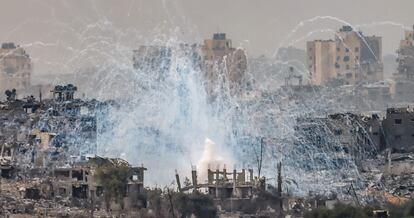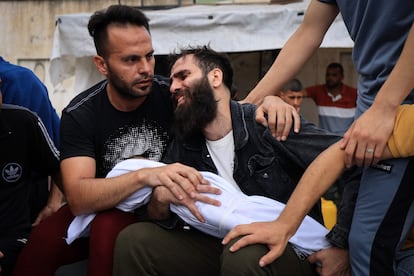Israeli army expands ground offensive in Gaza after attacking 450 Hamas positions in one day
Thousands of desperate Gazans raided U.N. food warehouses while phone and internet connectivity was gradually restored. Another 10 trucks carrying humanitarian aid entered through the Rafah crossing


Israel’s ground invasion of the Gaza Strip entered its second day on Sunday with a reinforcement of troops and tank units operating inside the Palestinian enclave, according to a spokesman of the Israeli Armed Forces. Hamas claims that the Israeli advance has met stiff resistance in the north of the enclave, where the Islamist group said they have destroyed two tanks and fought “violent clashes” following the “incursion of the occupying forces,” according to a statement quoted by Agence France Presse.
Israeli warplanes have attacked more than 450 Hamas military targets in the past 24 hours, including operational command centers, observation posts and anti-tank missile launch pads, the Israeli military reported. At the same time, rockets fired by Gaza-based militias are sowing panic in the Tel Aviv metropolitan area. This information could not be independently verified.
The United Nations considers these air raids to be the “most intense” since the start of the war on October 7. Since then, Israel has reported around 1,400 fatalities, while more than 200 people were taken hostage, most of them in the massive attack launched by the Ezzedin al Qassam Brigades, the armed branch of the Islamist movement. Meanwhile, the Ministry of Health of Gaza, a territory controlled by Hamas since 2007, on Sunday raised the number of Palestinian deaths during the conflict to more than 8,000, including more than 3,300 children.
Telephone and internet connectivity has been gradually returning to the Gaza Strip since early Sunday, after being knocked out on Friday night when Israel intensified its airstrikes. News is once again emerging about the desperate situation of the 2.3 million residents of the coastal territory, which has been completely blocked by Israel for the last three weeks. Rear Admiral Daniel Hagari, the Israeli military spokesman, again urged the population of northern Gaza to evacuate to the south.
On Sunday, U.S. President Joe Biden had a telephone conversation with Benjamin Netanyahu, according to the Israeli Prime Minister’s personal office, urging the head of the Israeli government to comply with international law, which “prioritizes the protection of civilians,” and to increase the flow of humanitarian assistance to Gaza.
The United Nations agency for Palestinian refugees (UNRWA) reported that thousands of Gazans raided the organization’s warehouses and distribution centers this Sunday to obtain wheat flour and other “basic survival items.” The looting took place in central and southern Gaza. “This is a worrying sign that civil order is starting to break down after three weeks of war and a tight siege on Gaza. People are scared, frustrated and desperate. Tensions and fear are made worse by the cuts in the phones and internet communication lines. They feel that they are on their own, cut off from their families inside Gaza and the rest of the world,” said Thomas White, director of UNRWA Affairs in the Gaza Strip.

On Sunday, 34 aid trucks carrying food, water and medical supplies entered Gaza through the Rafah border crossing in Egypt, according to the Red Crescent. For now, only 118 aid vehicles have been allowed into Gaza since the start of the war, compared to a usual average of 500 a day. Last week, 14 trucks entered on Monday; eight on Tuesday; 12 on Thursday and 10 on Friday. During this time, supplies have been trickling in and Israel has not yet allowed fuel, which is vital for the operation of desalination and water purification plants and hospitals. Gazans are still unable to leave. From Friday night, at the beginning of the second phase of Israel’s war operations, until noon on Sunday, no trucks had entered Gaza. Israel announced that it had opened the second of the three water supply pipes that were cut off at the beginning of the hostilities. The third remains closed.
A long war
In a televised briefing on Sunday, Rear Admiral Daniel Hagari, the military spokesman, said that “we are gradually expanding the ground activity and the scope of our forces in the Gaza Strip.”
“The war may last weeks or months,” Interior Command (Civil Defense) chief General Rafi Milo warned Sunday, as quoted by the Haaretz daily, “but it is going to be a long war.” Army Chief of Staff Herzl Halevi announced to soldiers deployed in and around the Gaza Strip that the war will be “a long process” and that actions are now focused on dismantling the Hamas organization.
Colonel Elad Goren, a member of the Israeli Defense Ministry body that coordinates civilian issues in Gaza and the West Bank (COGAT), said that Israel will allow a significant increase in the influx of humanitarian aid into Gaza in the coming days. “We have established a humanitarian zone in the south of Gaza in the Khan Yunis area, and we still recommend that the evacuated civilian population go to this area,” Goren pointed out. However, shelling has not only been taking place in northern Gaza, where Israel continues to insist that the population must leave their homes; attacks have also been reported in the supposedly safer area in the south of the enclave, including Khan Younis.
Western countries are generally supporting Israel’s right to defend itself following the attack on October 7 — the largest in a single day since the creation of the Jewish state 75 years ago — within the framework of the humanitarian laws of war. Following the start of ground operations inside Gaza, a growing number of nations are calling for temporary “pauses” or truces to allow humanitarian aid to reach the Gazan civilian population.
Sign up for our weekly newsletter to get more English-language news coverage from EL PAÍS USA Edition
Tu suscripción se está usando en otro dispositivo
¿Quieres añadir otro usuario a tu suscripción?
Si continúas leyendo en este dispositivo, no se podrá leer en el otro.
FlechaTu suscripción se está usando en otro dispositivo y solo puedes acceder a EL PAÍS desde un dispositivo a la vez.
Si quieres compartir tu cuenta, cambia tu suscripción a la modalidad Premium, así podrás añadir otro usuario. Cada uno accederá con su propia cuenta de email, lo que os permitirá personalizar vuestra experiencia en EL PAÍS.
¿Tienes una suscripción de empresa? Accede aquí para contratar más cuentas.
En el caso de no saber quién está usando tu cuenta, te recomendamos cambiar tu contraseña aquí.
Si decides continuar compartiendo tu cuenta, este mensaje se mostrará en tu dispositivo y en el de la otra persona que está usando tu cuenta de forma indefinida, afectando a tu experiencia de lectura. Puedes consultar aquí los términos y condiciones de la suscripción digital.








































